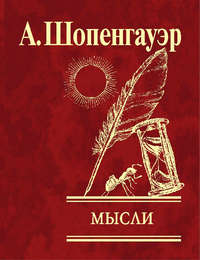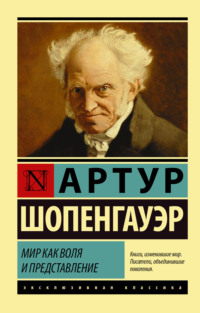 полная версия
полная версияThe World as Will and Idea (Vol. 2 of 3)
A trifling and absurd, but striking example of that mysterious and immediate power which the will exercises over the intellect, is the fact that in doing accounts we make mistakes much oftener in our own favour than to our disadvantage, and this without the slightest dishonest intention, merely from the unconscious tendency to diminish our Debit and increase our Credit.
Lastly, the fact is also in point here, that when advice is given the slightest aim or purpose of the adviser generally outweighs his insight, however great it may be; therefore we dare not assume that he speaks from the latter when we suspect the existence of the former. How little perfect sincerity is to be expected even from otherwise honest persons whenever their interests are in any way concerned we can gather from the fact that we so often deceive ourselves when hope bribes us, or fear befools us, or suspicion torments us, or vanity flatters us, or an hypothesis blinds us, or a small aim which is close at hand injures a greater but more distant one; for in this we see the direct and unconscious disadvantageous influence of the will upon knowledge. Accordingly it ought not to surprise us if in asking advice the will of the person asked directly dictates the answer even before the question could penetrate to the forum of his judgment.
I wish in a single word to point out here what will be fully explained in the following book, that the most perfect knowledge, thus the purely objective comprehension of the world, i. e., the comprehension of genius, is conditioned by a silence of the will so profound that while it lasts even the individuality vanishes from consciousness and the man remains as the pure subject of knowing, which is the correlative of the Idea.
The disturbing influence of the will upon the intellect, which is proved by all these phenomena, and, on the other hand, the weakness and frailty of the latter, on account of which it is incapable of working rightly whenever the will is in any way moved, gives us then another proof that the will is the radical part of our nature, and acts with original power, while the intellect, as adventitious and in many ways conditioned, can only act in a subordinate and conditional manner.
There is no direct disturbance of the will by the intellect corresponding to the disturbance and clouding of knowledge by the will that has been shown. Indeed we cannot well conceive such a thing. No one will wish to construe as such the fact that motives wrongly taken up lead the will astray, for this is a fault of the intellect in its own function, which is committed quite within its own province, and the influence of which upon the will is entirely indirect. It would be plausible to attribute irresolution to this, for in its case, through the conflict of the motives which the intellect presents to the will, the latter is brought to a standstill, thus is hindered. But when we consider it more closely, it becomes very clear that the cause of this hindrance does not lie in the activity of the intellect as such, but entirely in external objects which are brought about by it, for in this case they stand in precisely such a relation to the will, which is here interested, that they draw it with nearly equal strength in different directions. This real cause merely acts through the intellect as the medium of motives, though certainly under the assumption that it is keen enough to comprehend the objects in their manifold relations. Irresolution, as a trait of character, is just as much conditioned by qualities of the will as of the intellect. It is certainly not peculiar to exceedingly limited minds, for their weak understanding does not allow them to discover such manifold qualities and relations in things, and moreover is so little fitted for the exertion of reflection and pondering these, and then the probable consequences of each step, that they rather decide at once according to the first impression, or according to some simple rule of conduct. The converse of this occurs in the case of persons of considerable understanding. Therefore, whenever such persons also possess a tender care for their own well-being, i. e., a very sensitive egoism, which constantly desires to come off well and always to be safe, this introduces a certain anxiety at every step, and thereby irresolution. This quality therefore indicates throughout not a want of understanding but a want of courage. Yet very eminent minds survey the relations and their probable developments with such rapidity and certainty, that if they are only supported by some courage they thereby acquire that quick decision and resolution that fits them to play an important part in the affairs of the world, if time and circumstances afford them the opportunity.
The only decided, direct restriction and disturbance which the will can suffer from the intellect as such may indeed be the quite exceptional one, which is the consequence of an abnormally preponderating development of the intellect, thus of that high endowment which has been defined as genius. This is decidedly a hindrance to the energy of the character, and consequently to the power of action. Hence it is not the really great minds that make historical characters, because they are capable of bridling and ruling the mass of men and carrying out the affairs of the world; but for this persons of much less capacity of mind are qualified when they have great firmness, decision, and persistency of will, such as is quite inconsistent with very high intelligence. Accordingly, where this very high intelligence exists we actually have a case in which the intellect directly restricts the will.
6. In opposition to the hindrances and restrictions which it has been shown the intellect suffers from the will, I wish now to show, in a few examples, how, conversely, the functions of the intellect are sometimes aided and heightened by the incitement and spur of the will; so that in this also we may recognise the primary nature of the one and the secondary nature of the other, and it may become clear that the intellect stands to the will in the relation of a tool.
A motive which affects us strongly, such as a yearning desire or a pressing need, sometimes raises the intellect to a degree of which we had not previously believed it capable. Difficult circumstances, which impose upon us the necessity of certain achievements, develop entirely new talents in us, the germs of which were hidden from us, and for which we did not credit ourselves with any capacity. The understanding of the stupidest man becomes keen when objects are in question that closely concern his wishes; he now observes, weighs, and distinguishes with the greatest delicacy even the smallest circumstances that have reference to his wishes or fears. This has much to do with the cunning of half-witted persons, which is often remarked with surprise. On this account Isaiah rightly says, vexatio dat intellectum, which is therefore also used as a proverb. Akin to it is the German proverb, “Die Noth ist die Mutter der Künste” (“Necessity is the mother of the arts”); when, however, the fine arts are to be excepted, because the heart of every one of their works, that is, the conception, must proceed from a perfectly will-less, and only thereby purely objective, perception, if they are to be genuine. Even the understanding of the brutes is increased considerably by necessity, so that in cases of difficulty they accomplish things at which we are astonished. For example, they almost all calculate that it is safer not to run away when they believe they are not seen; therefore the hare lies still in the furrow of the field and lets the sportsman pass close to it; insects, when they cannot escape, pretend to be dead, &c. We may obtain a fuller knowledge of this influence from the special history of the self-education of the wolf, under the spur of the great difficulty of its position in civilised Europe; it is to be found in the second letter of Leroy's excellent book, “Lettres sur l'intelligence et la perfectibilité des animaux.” Immediately afterwards, in the third letter, there follows the high school of the fox, which in an equally difficult position has far less physical strength. In its case, however, this is made up for by great understanding; yet only through the constant struggle with want on the one hand and danger on the other, thus under the spur of the will, does it attain that high degree of cunning which distinguishes it especially in old age. In all these enhancements of the intellect the will plays the part of a rider who with the spur urges the horse beyond the natural measure of its strength.
In the same way the memory is enhanced through the pressure of the will. Even if it is otherwise weak, it preserves perfectly what has value for the ruling passion. The lover forgets no opportunity favourable to him, the ambitious man forgets no circumstance that can forward his plans, the avaricious man never forgets the loss he has suffered, the proud man never forgets an injury to his honour, the vain man remembers every word of praise and the most trifling distinction that falls to his lot. And this also extends to the brutes: the horse stops at the inn where once long ago it was fed; dogs have an excellent memory for all occasions, times, and places that have afforded them choice morsels; and foxes for the different hiding-places in which they have stored their plunder.
Self-consideration affords opportunity for finer observations in this regard. Sometimes, through an interruption, it has entirely escaped me what I have just been thinking about, or even what news I have just heard. Now if the matter had in any way even the most distant personal interest, the after-feeling of the impression which it made upon the will has remained. I am still quite conscious how far it affected me agreeably or disagreeably, and also of the special manner in which this happened, whether, even in the slightest degree, it vexed me, or made me anxious, or irritated me, or depressed me, or produced the opposite of these affections. Thus the mere relation of the thing to my will is retained in the memory after the thing itself has vanished, and this often becomes the clue to lead us back to the thing itself. The sight of a man sometimes affects us in an analogous manner, for we remember merely in general that we have had something to do with him, yet without knowing where, when, or what it was, or who he is. But the sight of him still recalls pretty accurately the feeling which our dealings with him excited in us, whether it was agreeable or disagreeable, and also in what degree and in what way. Thus our memory has preserved only the response of the will, and not that which called it forth. We might call what lies at the foundation of this process the memory of the heart; it is much more intimate than that of the head. Yet at bottom the connection of the two is so far-reaching that if we reflect deeply upon the matter we will arrive at the conclusion that memory in general requires the support of a will as a connecting point, or rather as a thread upon which the memories can range themselves, and which holds them firmly together, or that the will is, as it were, the ground to which the individual memories cleave, and without which they could not last; and that therefore in a pure intelligence, i. e., in a merely knowing and absolutely will-less being, a memory cannot well be conceived. Accordingly the improvement of the memory under the spur of the ruling passion, which has been shown above, is only the higher degree of that which takes place in all retention and recollection; for its basis and condition is always the will. Thus in all this also it becomes clear how very much more essential to us the will is than the intellect. The following facts may also serve to confirm this.
The intellect often obeys the will; for example, if we wish to remember something, and after some effort succeed; so also if we wish now to ponder something carefully and deliberately, and in many such cases. Sometimes, again, the intellect refuses to obey the will; for example, if we try in vain to fix our minds upon something, or if we call in vain upon the memory for something that was intrusted to it. The anger of the will against the intellect on such occasions makes its relation to it and the difference of the two very plain. Indeed the intellect, vexed by this anger, sometimes officiously brings what was asked of it hours afterwards, or even the following morning, quite unexpectedly and unseasonably. On the other hand, the will never really obeys the intellect; but the latter is only the ministerial council of that sovereign; it presents all kinds of things to the will, which then selects what is in conformity with its nature, though in doing so it determines itself with necessity, because this nature is unchangeable and the motives now lie before it. Hence no system of ethics is possible which moulds and improves the will itself. For all teaching only affects knowledge, and knowledge never determines the will itself, i. e., the fundamental character of willing, but only its application to the circumstances present. Rectified knowledge can only modify conduct so far as it proves more exactly and judges more correctly what objects of the will's choice are within its reach; so that the will now measures its relation to things more correctly, sees more clearly what it desires, and consequently is less subject to error in its choice. But over the will itself, over the main tendency or fundamental maxim of it, the intellect has no power. To believe that knowledge really and fundamentally determines the will is like believing that the lantern which a man carries by night is the primum mobile of his steps. Whoever, taught by experience or the admonitions of others, knows and laments a fundamental fault of his character, firmly and honestly forms the intention to reform and give it up; but in spite of this, on the first opportunity, the fault receives free course. New repentance, new intentions, new transgressions. When this has been gone through several times he becomes conscious that he cannot improve himself, that the fault lies in his nature and personality, indeed is one with this. Now he will blame and curse his nature and personality, will have a painful feeling, which may rise to anguish of consciousness, but to change these he is not able. Here we see that which condemns and that which is condemned distinctly separate: we see the former as a merely theoretical faculty, picturing and presenting the praiseworthy, and therefore desirable, course of life, but the other as something real and unchangeably present, going quite a different way in spite of the former: and then again the first remaining behind with impotent lamentations over the nature of the other, with which, through this very distress, it again identifies itself. Will and intellect here separate very distinctly. But here the will shows itself as the stronger, the invincible, unchangeable, primitive, and at the same time as the essential thing in question, for the intellect deplores its errors, and finds no comfort in the correctness of the knowledge, as its own function. Thus the intellect shows itself entirely secondary, as the spectator of the deeds of another, which it accompanies with impotent praise and blame, and also as determinable from without, because it learns from experience, weighs and alters its precepts. Special illustrations of this subject will be found in the “Parerga,” vol. ii. § 118 (second ed., § 119.) Accordingly, a comparison of our manner of thinking at different periods of our life will present a strange mixture of permanence and changeableness. On the one hand, the moral tendency of the man in his prime and the old man is still the same as was that of the boy; on the other hand, much has become so strange to him that he no longer knows himself, and wonders how he ever could have done or said this and that. In the first half of life to-day for the most part laughs at yesterday, indeed looks down on it with contempt; in the second half, on the contrary, it more and more looks back at it with envy. But on closer examination it will be found that the changeable element was the intellect, with its functions of insight and knowledge, which, daily appropriating new material from without, presents a constantly changing system of thought, while, besides this, it itself rises and sinks with the growth and decay of the organism. The will, on the contrary, the basis of this, thus the inclinations, passions, and emotions, the character, shows itself as what is unalterable in consciousness. Yet we have to take account of the modifications that depend upon physical capacities for enjoyment, and hence upon age. Thus, for example, the eagerness for sensuous pleasure will show itself in childhood as a love of dainties, in youth and manhood as the tendency to sensuality, and in old age again as a love of dainties.
7. If, as is generally assumed, the will proceeded from knowledge, as its result or product, then where there is much will there would necessarily also be much knowledge, insight, and understanding. This, however, is absolutely not the case; rather, we find in many men a strong, i. e., decided, resolute, persistent, unbending, wayward, and vehement will, combined with a very weak and incapable understanding, so that every one who has to do with them is thrown into despair, for their will remains inaccessible to all reasons and ideas, and is not to be got at, so that it is hidden, as it were, in a sack, out of which it wills blindly. Brutes have often violent, often stubborn wills, but yet very little understanding. Finally, plants only will without any knowledge at all.
If willing sprang merely from knowledge, our anger would necessarily be in every case exactly proportionate to the occasion, or at least to our relation to it, for it would be nothing more than the result of the present knowledge. This, however, is rarely the case; rather, anger generally goes far beyond the occasion. Our fury and rage, the furor brevis, often upon small occasions, and without error regarding them, is like the raging of an evil spirit which, having been shut up, only waits its opportunity to dare to break loose, and now rejoices that it has found it. This could not be the case if the foundation of our nature were a knower, and willing were merely a result of knowledge; for how came there into the result what did not lie in the elements? The conclusion cannot contain more than the premisses. Thus here also the will shows itself as of a nature quite different from knowledge, which only serves it for communication with the external world, but then the will follows the laws of its own nature without taking from the intellect anything but the occasion.
The intellect, as the mere tool of the will, is as different from it as the hammer from the smith. So long as in a conversation the intellect alone is active it remains cold. It is almost as if the man himself were not present. Moreover, he cannot then, properly speaking, compromise himself, but at the most can make himself ridiculous. Only when the will comes into play is the man really present: now he becomes warm, nay, it often happens, hot. It is always the will to which we ascribe the warmth of life; on the other hand, we say the cold understanding, or to investigate a thing coolly, i. e., to think without being influenced by the will. If we attempt to reverse the relation, and to regard the will as the tool of the intellect, it is as if we made the smith the tool of the hammer.
Nothing is more provoking, when we are arguing against a man with reasons and explanations, and taking all pains to convince him, under the impression that we have only to do with his understanding, than to discover at last that he will not understand; that thus we had to do with his will, which shuts itself up against the truth and brings into the field wilful misunderstandings, chicaneries, and sophisms in order to intrench itself behind its understanding and its pretended want of insight. Then he is certainly not to be got at, for reasons and proofs applied against the will are like the blows of a phantom produced by mirrors against a solid body. Hence the saying so often repeated, “Stat pro ratione voluntas.” Sufficient evidence of what has been said is afforded by ordinary life. But unfortunately proofs of it are also to be found on the path of the sciences. The recognition of the most important truths, of the rarest achievements, will be looked for in vain from those who have an interest in preventing them from being accepted, an interest which either springs from the fact that such truths contradict what they themselves daily teach, or else from this, that they dare not make use of them and teach them; or if all this be not the case they will not accept them, because the watchword of mediocrity will always be, Si quelqu'un excelle parmi nous, qu'il aille exceller ailleurs, as Helvetius has admirably rendered the saying of the Ephesian in the fifth book of Cicero's “Tusculanæ” (c. 36), or as a saying of the Abyssinian Fit Arari puts it, “Among quartzes adamant is outlawed.” Thus whoever expects from this always numerous band a just estimation of what he has done will find himself very much deceived, and perhaps for a while he will not be able to understand their behaviour, till at last he finds out that while he applied himself to knowledge he had to do with the will, thus is precisely in the position described above, nay, is really like a man who brings his case before a court the judges of which have all been bribed. Yet in particular cases he will receive the fullest proof that their will and not their insight opposed him, when one or other of them makes up his mind to plagiarism. Then he will see with astonishment what good judges they are, what correct perception of the merit of others they have, and how well they know how to find out the best, like the sparrows, who never miss the ripest cherries.
The counterpart of the victorious resistance of the will to knowledge here set forth appears if in expounding our reasons and proofs we have the will of those addressed with us. Then all are at once convinced, all arguments are telling, and the matter is at once clear as the day. This is well known to popular speakers. In the one case, as in the other, the will shows itself as that which has original power, against which the intellect can do nothing.
8. But now we shall take into consideration the individual qualities, thus excellences and faults of the will and character on the one hand, and of the intellect on the other, in order to make clear, in their relation to each other, and their relative worth, the complete difference of the two fundamental faculties. History and experience teach that the two appear quite independently of each other. That the greatest excellence of mind will not easily be found combined with equal excellence of character is sufficiently explained by the extraordinary rarity of both, while their opposites are everywhere the order of the day; hence we also daily find the latter in union. However, we never infer a good will from a superior mind, nor the latter from the former, nor the opposite from the opposite, but every unprejudiced person accepts them as perfectly distinct qualities, the presence of which each for itself has to be learned from experience. Great narrowness of mind may coexist with great goodness of heart, and I do not believe Balthazar Gracian was right in saying (Discreto, p. 406), “No ay simple, que no sea malicioso” (“There is no simpleton who would not be malicious”), though he has the Spanish proverb in his favour, “Nunca la necedad anduvo sin malicia” (“Stupidity is never without malice”). Yet it may be that many stupid persons become malicious for the same reason as many hunchbacks, from bitterness on account of the neglect they have suffered from nature, and because they think they can occasionally make up for what they lack in understanding through malicious cunning, seeking in this a brief triumph. From this, by the way, it is also comprehensible why almost every one easily becomes malicious in the presence of a very superior mind. On the other hand, again, stupid people have very often the reputation of special good-heartedness, which yet so seldom proves to be the case that I could not help wondering how they had gained it, till I was able to flatter myself that I had found the key to it in what follows. Moved by a secret inclination, every one likes best to choose for his more intimate intercourse some one to whom he is a little superior in understanding, for only in this case does he find himself at his ease, because, according to Hobbes, “Omnis animi voluptas, omnisgue alacritas in eo sita est, quod quis habeat, quibuscum conferens se, possit magnifice sentire de se ipso” (De Cive, i. 5). For the same reason every one avoids him who is superior to himself; wherefore Lichtenberg quite rightly observes: “To certain men a man of mind is a more odious production than the most pronounced rogue.” And similarly Helvetius says: “Les gens médiocres ont un instinct sûr et prompt, pour connaître et fuir les gens d'esprit.” And Dr. Johnson assures us that “there is nothing by which a man exasperates most people more than by displaying a superior ability of brilliancy in conversation. They seem pleased at the time, but their envy makes them curse him in their hearts” (Boswell; aet. anno 74). In order to bring this truth, so universal and so carefully concealed, more relentlessly to light, I add the expression of it by Merck, the celebrated friend of Goethe's youth, from his story “Lindor:” “He possessed talents which were given him by nature and acquired by himself through learning; and thus it happened that in most society he left the worthy members of it far behind.” If, in the moment of delight at the sight of an extraordinary man, the public swallows these superiorities also, without actually at once putting a bad construction upon them, yet a certain impression of this phenomenon remains behind, which, if it is often repeated, may on serious occasions have disagreeable future consequences for him who is guilty of it. Without any one consciously noting that on this occasion he was insulted, no one is sorry to place himself tacitly in the way of the advancement of this man. Thus on this account great mental superiority isolates more than anything else, and makes one, at least silently, hated. Now it is the opposite of this that makes stupid people so generally liked; especially since many can only find in them what, according to the law of their nature referred to above, they must seek. Yet this the true reason of such an inclination no one will confess to himself, still less to others; and therefore, as a plausible pretext for it, will impute to those he has selected a special goodness of heart, which, as we have said, is in reality only very rarely and accidentally found in combination with mental incapacity. Want of understanding is accordingly by no means favourable or akin to goodness of character. But, on the other hand, it cannot be asserted that great understanding is so; nay, rather, no scoundrel has in general been without it. Indeed even the highest intellectual eminence can coexist with the worst moral depravity. An example of this is afforded by Bacon of Verulam: “Ungrateful, filled with the lust of power, wicked and base, he at last went so far that, as Lord Chancellor and the highest judge of the realm, he frequently allowed himself to be bribed in civil actions. Impeached before his peers, he confessed himself guilty, was expelled by them from the House of Lords, and condemned to a fine of forty thousand pounds and imprisonment in the Tower” (see the review of the latest edition of Bacon's Works in the Edinburgh Review, August 1837). Hence also Pope called him “the wisest, brightest, meanest of mankind” (“Essay on Man,” iv. 282). A similar example is afforded by the historian Guicciardini, of whom Rosini says in the Notizie Storiche, drawn from good contemporary sources, which is given in his historical romance “Luisa Strozzi:” “Da coloro, che pongono l'ingegno e il sapere al di sopra di tutte le umane qualità, questo uomo sarà riguardato come fra i più grandi del suo secolo: ma da quelli, che reputano la virtù dovere andare innanzi a tutto, non potra esecrarsi abbastanza la sua memoria. Esso fu il più crudele fra i cittadini a perseguitare, uccidere e confinare,” &c.32









